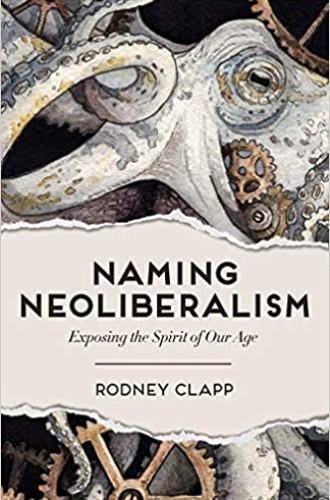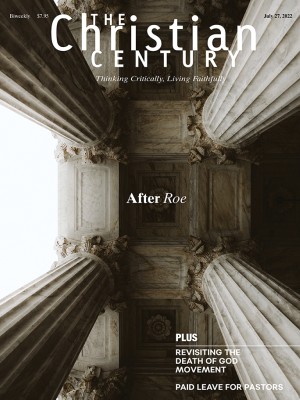A prophetic word against neoliberalism
It runs our lives while pretending it isn’t there, says Rodney Clapp. He is having none of it.
A time-honored and beloved Canadian custom—along with griping about the weather while taking secret pride in it—is pronouncing armchair judgments on the United States. We might be smug or defensive, envious or baffled, but we sure know you’re there. Seen from this side of the 49th parallel, the fanatic idolatry of freedom witnessed in certain elements of American culture is both fascinating and appalling, as are the gaps in logic, to wit: no degree of freedom from interference or regulation seems to free Americans—particularly the right-wing Americans holding the country hostage—from fear.
Into this reality steps cultural critic Rodney Clapp, a former Century columnist and current editor at Cascade Books. Raising his voice unequivocally, urgently, furiously, and hopefully, Clapp is here to take on the long, tentacled arms of the monster hiding in the shadows of this fear: neoliberalism.
Read our latest issue or browse back issues.
Aimed, in the author’s words, at “pastors and thoughtful laypersons who haven’t had the leisure to examine and articulate for themselves just what neoliberalism is and just why it should be resisted,” the book is a concise, well-structured, erudite, and accessible raising of the alarm. Neoliberalism is not only running our lives, Clapp contends, it does so while pretending it isn’t there. Clapp is having none of it, and in his relentless pursuit of exposing its presence he proposes an apocalyptic framework “as the throbbing heart of Christian faith and hope.”
For those who need a vocabulary primer (as I did), Clapp helpfully provides one. The liberalism that eventually gave birth to the philosophical kraken that is neoliberalism is not the left-of-centrism we think of today. Classical liberalism, born of 19th-century European (and adjacent) thinking, held that “the motor and foundation for the construction of a free society was the free-market economy.” Clapp doesn’t tell us whether classical liberalism had an opposite back in the day, but one can see that this school of thought is in fact the progenitor of much of today’s conservative thinking, which would rather keep government off the playing field.
Reform liberalism, born of Franklin D. Roosevelt’s presidency and necessitated by the calamitous early decades of the 20th century, might share classical liberalism’s fear of government as a threat to individual freedom, but it worries “at least equally about the instability of capitalism and exaggerated concentrations of corporate business power.” It worries, in other words, that unfettered markets cannot reliably produce conditions for the stability and enjoyment of a free society.
Neoliberalism is a contemporary offshoot of classical liberalism, setting “marketized competition at the center of social life—even as the sole ruler of social life.” Society does not merely include markets but is based on them: the market becomes the basis for all of society. There are no collective entities, only individuals who compete for excellence and winnings in all arenas of life. Common interests and the common good are nonexistent; individual freedom tops all other virtues and assumes people to be “autonomous self-governed entities, all coming naturally equipped with some version of ‘rationality.’”
This perspective, argues Clapp, is flawed: “While we all want to be free from many things, we aren’t at all sure what we are free for.” We are not, as neoliberalism would have us believe, untethered to stories, history, collective life, or mutual impact. And so Clapp talks back to the neoliberal mythology.
To do this, he first grounds us in the early days of liberalism and its links to capitalism. It is here that Clapp’s arguments are weakest. His portrait of the relationship between precapitalist medieval markets and the Christian church verges on the nostalgic. He writes of the church as extending a watchful eye in order to guide trade to ethical ends, allowing for a religiously and morally directed economy. Given that the Reformers’ objections to the wealth, corruption, and power of the church were neither new nor isolated, this seems a stretch. If the medieval European economy was indeed as oriented to the public benefit as Clapp claims, he needs better and more extensive evidence to make the point.
While Clapp acknowledges that liberalism did not arise in a vacuum and that it did, with capitalism, bring boons to the lives of many, there is an absence of clarity about what conditions and circumstances would have impelled the reaction that became liberalism. What, beyond the naked greed driving much of the Industrial Revolution, did modernism and then liberalism promise? Without understanding the roots and appeal of philosophies that have birthed the oppressive structures of our own day, we risk the particular doom of those who forget history.
The other point missing is an acknowledgment of the Eurocentric nature of the history examined and the US-centric assumptions of the current reality. While this is understandable in a book clearly written for a US readership, the insidiousness of neoliberalism includes an “America first, America only” tunnel vision that needs naming and combating.
Once Clapp goes on to describe today’s neoliberalism and the apocalyptic foundations of his theological arguments, however, he is on solid ground. The fierce clarity with which he names and decries the mythology versus the reality of neoliberalism—including the much-beloved myth of personal responsibility in a world of systems—is compelling in its anger and lucidity. His understanding and exploration of Pauline apocalyptic thought anchors Paul firmly in the realities of Roman imperialism and urges on the reader the universal and comprehensive nature of God’s renewal of existence through Jesus Christ. Clapp’s writing about the eternal Christian paradox of the already/not-yet nature of the kingdom of God is some of the best I have encountered.
With this apocalyptic clarity, Clapp confronts tenets central to neoliberalism—such as the market, nationalism, exploitation of nature, and fear of death—and the shadow of hopelessness they cast. Apocalypse is not doom and catastrophe but revelation of the certainty and comprehensiveness of the new thing God is doing through the saving work of Jesus Christ. In light of this reality, Clapp argues, neoliberalism is not invincible. Rather, it is the thrashing of dying powers and principalities already defeated by Jesus’ crucifixion and resurrection. This is a message that is both sorely needed and fervently welcome.
A version of this article appears in the print edition under the title “Against neoliberalism.”







